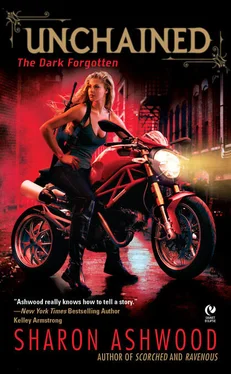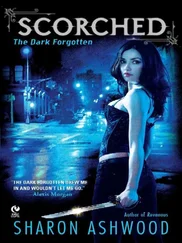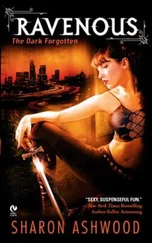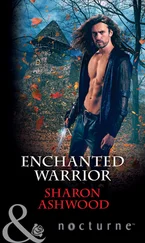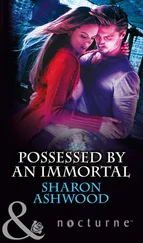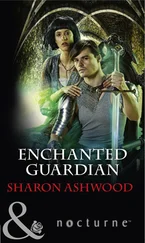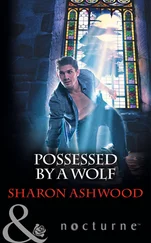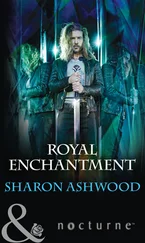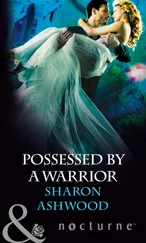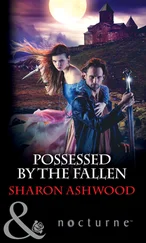Outside, he could hear his nieces and nephews shrieking with excitement. He winced at the pitch of the noise, then cringed again when he pushed back the curtain to admit bright sunshine. A soft, feathery coating of new snow lay on every branch and stone, intensifying the dazzling light. He squinted at the scene. The children, bundled in wraps and mittens, were in heaven.
Noisy little buggers, Reynard thought, but fondly. He had played under the same snow-dusted trees in his time.
Then Elizabeth emerged from the house, wrapped in furs, her hands tucked into a muff. She laughed with the children, walking toward them with cautious, tiny steps. The paving stones must have frozen over with ice.
Lizzie. A poet could say how beautiful she was, how soft her fawn-brown hair, how smooth her skin, but Reynard was no poet. The sight of her killed the words inside him, striking him dumb, and empty, and full of lost echoes. She had that power over his spirit. She had kept him from loving anyone else.
Elizabeth, his brother’s wife. She had been his, but then Faulkner, with the title and fortune of the firstborn son, had come along. Elizabeth claimed her parents had made them marry, but he had always wondered. She’d fancied a coat of arms.
After that, Julian Reynard, dashing cavalry captain, was merely a comet that came blazing through from time to time, wakening dreams and stirring discord. If he loved his brother, if he loved Lizzie, he had to let her go.
Reynard started awake. Where the hell am I? He’d never been in this room before. He looked around, his tongue coated with the ashy taste that came from overusing magic. He was bone-tired, his limbs like sodden bread. He moved his gaze over the furniture. It looked new? Old? How could he tell? Everything looked modern to him. He closed his eyes, too tired to keep them open. He was thirsty, but sleep claimed him again before he could think any more about it.
He was dreaming, back in his old home, same day and date. He rinsed his face and smoothed back his long hair, tying it with a black ribbon. He pulled on his new uniform, thinking he would go out and about. A bit of gold lace impressed the ladies.
Reynard descended the stairs, still buttoning his coat. The bright, snow-reflected sun flooded the high-ceilinged hall, casting shards of light through the bevels in the window glass. Rainbows bounced off the crystal droplets dangling from the candelabra, ricocheted off the cut glass of a vase. The unforgiving light hurt his wine-soaked brain.
He stopped before the open door to the morning room, his gaze quickly spotting the coffee service sitting on a table by the window. The sun flooded in here, too, turning the steam from the coffeepot into a gossamer haze.
Faulkner, as fair-haired as Reynard was dark, and another man were sitting on either side of the fire in identical armchairs. Faulkner’s guest, an older man with a black coat and a full-bottomed wig, looked just the same as when he had visited their father years ago, but Reynard couldn’t remember the fellow’s name. Bellamy? Barstow? Beelzebub?
Bartholomew. That was it.
Faulkner was leaning forward, his elbows on his knees, his hands gripped together in an attitude of brooding worry. He flinched as Reynard strode across the Turkish carpet. Faulkner was either very tense or he had an equally vile hangover.
There were no servants in the room. Without a word, Reynard poured himself coffee and took a large bite out of a buttered biscuit. He wolfed down the food, standing with his back to the other men until he had something in his stomach. Rude, yes, but his temper would be far less risky if he was fed. He swallowed the last bite and picked up another biscuit, looking out at the prospect of the park and garden. The windows in the room were twice as tall as a man, draped with loops of sky-blue velvet. Beautiful, but they let in the cold as if there were nothing between the room and the snow outside. Dusting off his fingers, Reynard refilled his cup and moved toward the warmth of the fire.
All the while he had been eating, he had been eavesdropping on his brother’s conversation. His hearing had always been exceptional. Often he heard things he should not.
“So what is this nonsense?” He stopped, facing his brother. “You say your name came up in a lottery? What lottery? And what is this Order you speak of?” The name rang a bell, but he could not think why.
Faulkner lifted his head. “It’s not nonsense. I wish it were.”
“Then why did you never mention this Castle, if it’s so bloody important?”
Slowly, his brother sat back in the chair. “The odds of this happening were remote. The fewer people who know about the Castle, the better.”
“If something can turn your face as white as the snow outside, I have a right to know about it.” His point made, Reynard walked back to the table and neatly returned his cup to the tray. His life might be in all manner of disarray, but the army had instilled some need for order into his soul.
Bartholomew spoke for the first time since Reynard had entered the morning room. “Perhaps if the details are explained now, we can disregard what should or should not have been said in the past.”
The dry, dusty voice jolted him. The cruelty in it brought back memories of hiding under the stairs as a child. Another time he heard things that had confused him. Inwardly shaken, Reynard returned to his position, glaring down at his brother and folding his arms.
“Very well,” said Faulkner.
The older man shifted in the chair, leaning forward to look into Reynard’s face. “In the event that you do not remember me, my name is Bartholomew. I—as well as your father—have belonged to something called the Order for centuries. We look after—we guard—a particular castle.”
Faulkner buried his face in his hands. At the sight of his brother’s distress, a queasy sensation began invading Reynard’s gut. It was no longer the aftereffects of a night of drink. He recognized the cold seas of fear. “This is no ceremonial duty, I take it.”
“No,” said Faulkner, his voice quiet. “It is as dangerous as anything you faced in India. And it is absolutely, utterly real.”
Reynard’s mind groped for some point of reference. Despite Faulkner’s reaction, nothing about this conversation seemed believable. “Where is this castle?”
Bartholomew rose, restlessly pacing with his hands clasped behind his back. “That is the hardest question to answer.”
“How so?” Reynard protested, but Faulkner cut him off with a wave of the hand.
“Think back to the tales of the Dark Ages,” Faulkner said softly. “The stories of fey and demons, monsters and ghouls. Did you never wonder where such creatures went, why they walk the earth no more?”
“Not really,” Reynard said with a bark of laughter. “Those are nursery stories.”
“On the contrary,” said Bartholomew, his eyes meeting Reynard’s. “The sorcerers of old imprisoned all the evils in an infinite dungeon between the worlds.”
Realization nudged Reynard, not a bolt of brilliant insight, but the subtle bump of a stranger in a crowded room. He stared for a long moment, remembering scraps of conversation from childhood. Adults hushing as the children grew close, but not quickly enough that some shreds of their fantastic, gruesome news did not fall upon young ears. A book with a golden sun. Talk of warlocks. Talk of the Order.
So this is what all those mutterings were about. He tried to deny the thought, but it clung like cobwebs. Old, bad dreams revived in the dark places of his memory. In spite of the coolness of the room, he felt sweat trickle down his ribs.
“And the service you speak of?”
The old man shrugged. “A castle needs guards. The families of the Order send their sons.”
Читать дальше
